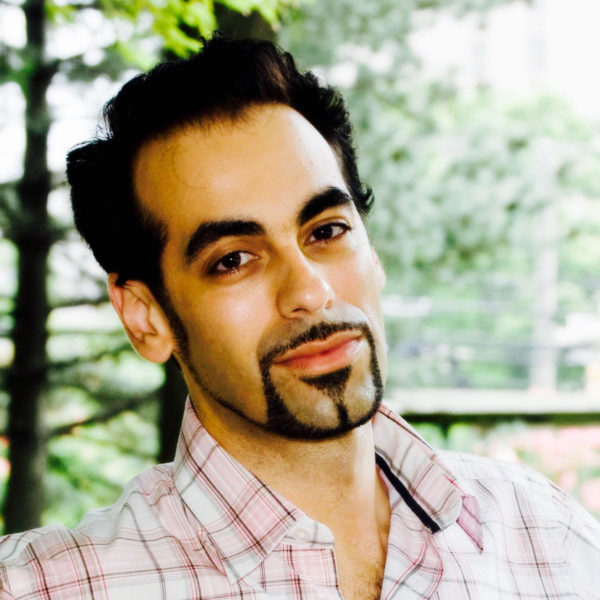
Image by runner310/Flickr (CC BY-NC-ND 2.0)..
Reverence for the Visible and Invisible Worlds
“This visible world is a trace of that invisible one and the former follows the latter like a shadow.”
— Al Ghazali
Lately, I’m consumed with idea of the artist as mystic, and the worship of beauty as a form of prayer. I pray by admiring a rose, Persian philosopher-poet Omar Khayyam is supposed to have said. There, in this deceptively simple utterance one finds the connection among the visible, invisible, and indivisible laid bare. Our metaphysical eyes are expert at collapsing distances this way, seeing through the apparent to the infinite.
One year before his death, Rilke is meditating upon the inseparability of the material and spiritual worlds, in these memorable words:
“It was within the power of the creative artist to build a bridge between two worlds, even though the task was almost too great for a man… Everywhere transience is plunging into the depths of Being. It is our task to imprint this temporary, perishable earth into ourselves, so deeply, so painfully and passionately, that its essence can rise again, invisible, inside of us. We are the bees of the invisible. We wildly collect the honey of the visible, to store it in the great golden hive of the invisible.”
Reverence for the visible world is not in opposition to the invisible one; in the same way that it is through the body we access the life of the spirit. Remembering we are “bees of the invisible,” sweetens the suffering and even cheats death of its ultimate sting. We are saved by the very idea of a back and forth, between a Here and There. Bodies are like poems that way, only a fraction of their power resides in the skin of things. The remainder belongs to the spirit that swims through them.
Here is another Persian poet, Hafiz, reflecting on the centrality of beauty to our well-being:
“The heart suffers when it cannot see and touch beauty, but beauty is not shy it is synonymous with existence.”
Beauty, far from being a superficial concern is essential, and can be a turnstile that leads us from the visible to the invisible world. To return to Khayyam, by admiring the rose — its inscrutable architecture and scented essence — we are made finer morally, spiritually even. This is how aesthetics can serve as an ethical code, and prayer is “the soliloquy of a beholding and jubilant soul” (Emerson’s definition).
Poets, philosophers and mystics, by their nature, seem especially well-suited to exposing the false divisions between the visible and invisible worlds. While a calling in the life of an artist might be divorced from the strictly religious sense of the word, it still requires similar renunciations, obedience and sacrifice. I can’t say I’ve studied the lives of mystics as closely as I have those of artists, yet the profound similarities seem difficult to dismiss. Time and again, I discover poets and thinkers I respect powerlessly submitting their private lives in the service of intensifying consciousness (out of what can only be described as an indestructible inner imperative). Thus, entire lives are anxiously arranged around the conditions most conducive to the maturity of this elusive faculty.
In a clutch of letters that amount to an astonishingly precocious declaration of intent, Rimbaud stated grandiloquently at sixteen:
“The poet makes himself a seer by a long, prodigious and systematic derangement of all the senses. Every form of love, of suffering, of madness; he searches himself, he consumes all the poisons in him, and keeps only their quintessence.”
Queerly concentrated as they are, with ink for blood, such artists may appear unfit for ordinary society, sworn as they are to this invisible, jealous mistress.
Writers of this ilk accept their creative calling with a supreme indifference to their personal welfare. In another letter written that same year, Rimbaud memorably pronounced:
“The sufferings are enormous, but one has to be tough, one has to be born a poet, and I’ve come to realize I’m a poet. It’s not all my fault. It’s wrong to say: I think. One has to say: I am thought … I is another. Too bad for the wood that finds itself a violin.”
Following a dream contributing to his conviction of having been “called,” Wittgenstein wrote in a letter at the age of 31, “I had a task…to become a star in the sky.” In his conception of philosophy — as a means of authentic existence equally concerned with logic as ethics — the spiritual, artistic, and metaphysical aspects of a calling are nearly fused. At a feverish pitch, we see the ascetic philosopher flirting with poverty, giving away an immense family fortune to pursue his ideal of living and working with the rural poor; with solitude, spending years alone in Norway and Ireland, to meditate and write; and with death, in the trenches of World War I, in the belief that he did not deserve to live unless he created great work.
The list is long and it goes on, one could marshal scores more. The artistic-philosophic landscape is teeming with seers of this type. Hannah Arendt, insofar, as I understand her, is another living sign. Simone Weil, another. The power and aura of these fiery spirits derives as much from the truths or realities they have revealed as what they’ve had to sacrifice along the way; it is an authority born of the tension between what is accomplished and what is suffered.
What such poets or philosophers have in common is a life-long struggle to build a bridge between the two worlds — an uncommon commitment to bear better witness and be, more fully. To travel to and fro, between the visible and the invisible, required a kind of vanishing act of the traveler, what Foucault called “a voluntary obliteration that does not have to be represented in books because it takes place in the very existence of the writer.”
On a personal note, I observe that something is taking place within me, a shift as decisive and imperceptible as a continental drift. I, who once identified with my mind, have come to feel I am standing at the very edge of it, and that it’s thin and flat. The time came to leap. My way into the life of the spirit began, unwittingly, when I first began experimenting with silence in university. I would attempt to go on silent fasts for days, rationing words, and speaking only when I must — perhaps a mouthful in class, or even less if someone absolutely needed to hear from me. Otherwise, friends understood that I’d “gone under” and only the very committed continued leaving me voice messages or, braver still, tagging along, noiselessly.
The idea at the time — more inner imperative, really, than any sort of formulated thought — was to sound my depths and think things through. This was my first taste of freedom as an adult, and that is how I chose to exercise it. It was as though, suddenly and without explanation, I was taken in for questioning, and I had to play both parts: officer and suspect. Who was I? What did I know? Why am I here? Do I have an alibi?
Typically, I’d walk around all day in a semi-trance talking back to the books I’d read, lost in the echo chamber of my head. I read a great deal more those days, again out of an inner imperative, but hardly the assigned work. My self-imposed reading list was a volatile cocktail, unequal parts literature and philosophy, and the discovery of those great contrarians, Wilde and Nietzsche, made my world spin faster.
Unaware of it then, this obsessive reading was in fact teaching me how to write. The rhythms and cadences of my masters insinuated themselves into my style, just as their stances and daring were persuading me to distrust ready-made ideas and try to formulate better questions.
It was out of these silences and (attendant) solitude that I began writing what would become a book of aphorisms — by transcribing the heady conversations that I was having with myself at the time. My “method” in writing these aphorisms was simply to jot down on a scrap of paper (the back of a napkin, receipt, or whatever else was handy) what I thought was worth quoting from my soul’s dialogue with itself. If ever I tried keeping a notebook, the thoughts would hesitate leaving their cave, sensing ambush. So, by night I kept bits of paper and a pencil by my side, just in case. And, when something did occur to me, I feverishly scribbled it down in the dark, without my glasses, out of the same superstitious cautiousness of scaring ideas off.
These aphorisms were to reveal me to myself and served as the biography of my mental, spiritual, and emotional life. I read as I wrote, helplessly, in a state of emergency; in my youthful fanaticism, I was convinced I was squeezing existence for answers, no less. I felt that one should only read on a need-to-know basis, and write discriminatingly, with the sole purpose of intensifying consciousness.
Strangely, during these years of white-hot inspiration, I discovered that when I returned home to Egypt (for the summer, Christmas, and eventually following graduation) I was unable to write aphorisms. No longer the master of my environment, and forced to accommodate the interruptions that make a life, I gradually realized that because I had lost my silences, I had lost my voice. Which is to say, I composed the bulk of the aphorisms in my book, Signposts to Elsewhere, before I turned 22.
It would take me several years to begin writing again and, out of this unsettling and involuntary silence, would be born two new forms: poetry and eventually essays. Now, after a decade or so of aphoristic silence, spurred by the terse wisdom of the Tao the Ching and Sufi masters, I find myself returning to these brief arts and speaking to my self in sayings, once more, noting how I and the writing are changing.
Encounter
I stirred in the small hours of the morning. Sensing a presence, I did not return to sleep, but ventured into the living room, apprehensively.
There, by the balcony, sat a familiar figure — cross-legged and reading in the semi-dark, with just the milky moonlight for company.
I do not know how I knew, but I did. I recognized the intruder, at once, with a mixture of dread and affection.
“I’m sorry,” were the only words to leave my lips. “I’m sorry, too,” replied my longed-for-self, with a sigh of infinite kindness and pity.
He did not rise to greet me and, somehow, spoke without words, transmitting what was needed.Catching his glistening eye, the caring made me cry. “You’ve taken every detour to avoid me,” he gently reproached. “For every step I’ve taken towards you, you’ve taken back two”.
I did not know what to say in my defense (how could I protest against myself?) “I missed you,” he said, and feared you’d forgotten me.”
His admonishment was tender as a kiss. “I visit from time to time, and hope you’ll ask me to stay.” I knew what he said was true, and felt that way, too.
“I worried,” he continued, “if I postponed this visit, we might never meet, in this life… and so I came to sharpen your appetite.”
He rose and moved towards me. “There’s no need to speak, return to sleep. But when you rise, try to remember me. And to keep awake.”

Share your reflection